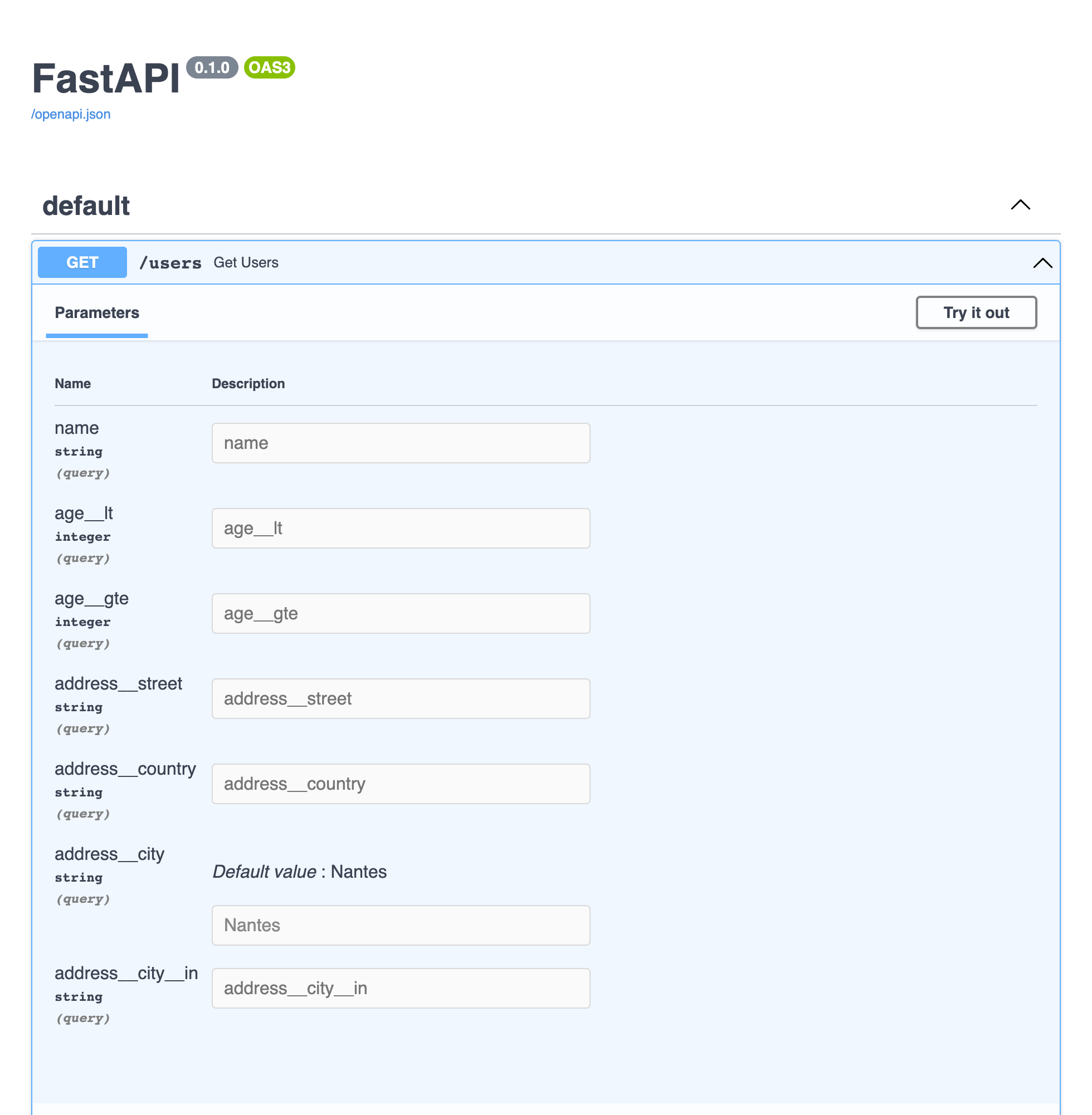FastAPI Filter
Add querystring filters to your api endpoints and show them in the swagger UI.
The supported backends are SQLAlchemy, MongoEngine and beanie.
Example

Filter
The philosophy of fastapi_filter is to be very declarative. You define the fields you want to be able to filter on as well as the type of operator, then tie your filter to a specific model.
Examples
Operators
By default, fastapi_filter supports the following operators:
neqgtgteinisnullltltenot/nenot_in/ninlike/ilike
Note: Mysql excludes None values when using in filter
For the list related operators (in, not_in), simply pass a comma separated list of strings to your api endpoint and
they will be converted into the list of the type you defined.
For example, if the filter field is age__in, you can send ?age__in=1,3,5,7,9.
Related fields
As long as you setup your query to join your related models, it's pretty straightforward to add related field filters and even re-use existing filters for their models.
As you can see in the examples, all it takes is something along the lines of:
from typing import Optional
class AddressFilter(Filter):
street: Optional[str]
country: Optional[str]
city__in: Optional[list[str]]
class Constants(Filter.Constants):
model = Address
class UserFilter(Filter):
name: Optional[str]
address: Optional[AddressFilter] = FilterDepends(with_prefix("address", AddressFilter))
class Constants(Filter.Constants):
model = User
@app.get("/users", response_model=list[UserOut])
async def get_users(user_filter: UserFilter = FilterDepends(UserFilter), db: AsyncSession = Depends(get_db)) -> Any:
query = user_filter.filter(select(User).outerjoin(Address)) #
result = await db.execute(query)
return result.scalars().all()
The with_prefix wrapper function sets the prefix for your filters, so in that example you would use
?address__city_in=Nantes,Boston for example.
FilterDepends
Wherever you would use a Depends, replace it with FilterDepends if you are passing a filter class. The reason is
that FilterDepends converts the list filter fields to str so that they can be displayed and used in swagger.
It also handles turning ValidationError into HTTPException(status_code=422).
Limitations
FilterDepends does not convert list type to str if it is part of union type with other
types except for None. For example type list[str] | None will work but list[str] | str will
not.
with_prefix
This is a utility function that will take an existing filter and prefix all its fields with a given value. It's mostly used for filtering related fields.
The following would be equivalent:
from typing import Optional
class AddressFilter(Filter):
street: Optional[str]
country: Optional[str]
class Constants(Filter.Constants):
model = Address
class UserFilter(Filter):
name: Optional[str]
address: Optional[AddressFilter] = FilterDepends(with_prefix("address", AddressFilter))
class Constants(Filter.Constants):
model = User
AND
class UserFilter(Filter):
name: Optional[str]
address__street: Optional[str]
address__country: Optional[str]
Order by
There is a specific field on the filter class that can be used for ordering. The default name is order_by and it
takes a list of string. From an API call perspective, just like the __in filters, you simply pass a comma separated
list of strings.
You can change the direction of the sorting (asc or desc) by prefixing with - or + (Optional, it's the
default behavior if omitted).
If you don't want to allow ordering on your filter, just don't add order_by (or custom ordering_field_name) as a field and you are all set.
Search
There is a specific field on the filter class that can be used for searching. The default name is search and it takes
a string.
You have to define what fields/columns to search in with the search_model_fields constant.
If you don't want to allow searching on your filter, just don't add search (or custom search_field_name) as a field and you are all set.
Example - Basic
from typing import Optional
from fastapi_filter.contrib.sqlalchemy import Filter
class UserFilter(Filter):
order_by: Optional[list[str]]
@app.get("/users", response_model=list[UserOut])
async def get_users(
user_filter: UserFilter = FilterDepends(UserFilter),
db: AsyncSession = Depends(get_db),
) -> Any:
query = select(User)
query = user_filter.sort(query)
result = await db.execute(query)
return result.scalars().all()
Valid urls:
/users?order_by=age,-created_at
/users
/users?order_by=-name
/users?order_by=+id
Example - Custom name
If for some reason you can't or don't want to use order_by as the field name for ordering, you can override it:
from typing import Optional
from fastapi_filter.contrib.sqlalchemy import Filter
class UserFilter(Filter):
class Constants(Filter.Constants):
model = User
ordering_field_name = "custom_order_by"
custom_order_by: Optional[list[str]]
@app.get("/users", response_model=list[UserOut])
async def get_users(
user_filter: UserFilter = FilterDepends(UserFilter),
db: AsyncSession = Depends(get_db),
) -> Any:
query = select(User)
query = user_filter.sort(query)
result = await db.execute(query)
return result.scalars().all()
Valid urls:
curl /users?custom_order_by=age,-created_at
curl /users
curl /users?custom_order_by=-name
curl /users?custom_order_by=+id
Restrict the order_by values
Add the following field_validator to your filter class:
from typing import Optional
from fastapi_filter.contrib.sqlalchemy import Filter
from pydantic import field_validator
class MyFilter(Filter):
order_by: Optional[list[str]]
@field_validator("order_by")
def restrict_sortable_fields(cls, value):
if value is None:
return None
allowed_field_names = ["age", "id"]
for field_name in value:
field_name = field_name.replace("+", "").replace("-", "") #
if field_name not in allowed_field_names:
raise ValueError(f"You may only sort by: {', '.join(allowed_field_names)}")
return value
Example - Search
If for some reason you can't or don't want to use search as the field name for searching, you can override it by
setting search_field_name:
from typing import Optional
from fastapi_filter.contrib.sqlalchemy import Filter
class UserFilter(Filter):
class Constants(Filter.Constants):
model = User
search_field_name = "custom_name_for_search"
search_model_fields = ["name", "email"] # It will search in both `name` and `email` columns.
@app.get("/users", response_model=list[UserOut])
async def get_users(
user_filter: UserFilter = FilterDepends(UserFilter),
db: AsyncSession = Depends(get_db),
) -> Any:
query = select(User)
query = user_filter.sort(query)
result = await db.execute(query)
return result.scalars().all()
Valid urls:
curl /users?custom_name_for_search=Johnny